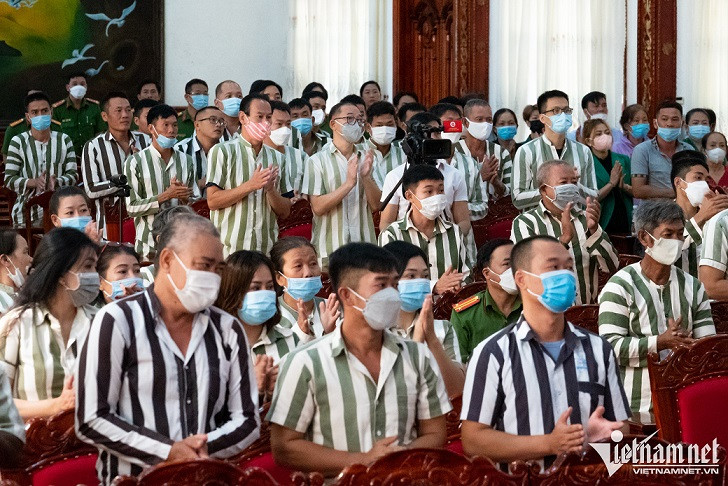
The Convention against Torture and Other Cruel, Inhuman or Degrading Treatment or Punishment (CAT) is one of nine core treaties of the United Nations on human rights, which was adopted by the United Nations General Assembly on December 10, 1984 under Resolution No. 39/64, and came into force on June 26, 1987 after being ratified by 20 countries.
In Vietnam, on November 28, 2014, at Session 8, the 13th National Assembly passed Resolution No. 83/2014/QH13 on ratifying this convention.
Vietnam completed the procedures and submitted the ratification documents to the United Nations Secretary General on February 5, 2015 and became the 158th member state of the Convention on March 7, 2015.
On August 24, regarding Vietnam's efforts in implementation the CAT, Colonel, Associate Professor, Dr. Tran Nguyen Quan, Deputy Director of the Department of Legal Affairs and Administrative and Judicial Reform under the Ministry of Public Security told the media that: Recognizing the important role and position of the CAT, Vietnam has continuously strived to implement comprehensive measures to effectively implement the Convention in Vietnam. Vietnam’s achievement is highly appreciated by other countries and international organizations, especially in four aspects: propaganda and dissemination of laws on torture prevention and control and the content of the Convention against Torture; international cooperation in torture prevention and control; internalizing law, improving the effectiveness of law application, and satisfying the requirements of the Convention; building and defending the first and periodic National Report on the implementation of the Convention against Torture.
Based on the national plan on implementation of the CAT, the government’s plan to diffuse the CAT and Vietnamese law on torture prevention and control, ministries, agencies and 63 provinces and cities have developed implementation plans, issued propaganda projects, compile and publish books, propaganda materials, teaching materials, news, articles, reports, and special topics on the media.
Many regulations on preventing and punishing acts related to torture in the Convention have been internalized into the Penal Code 2015 (amended in 2017), the Criminal Procedure Code 2015 (amended in 2021), the Law on Organization of Criminal Investigation Agencies 2015, the Law on Enforcement of Custody and Temporary Detention 2015, the Law on Execution of Criminal Judgments 2019, the Law on Handling of Administrative Violations (amended in 2020)... and guiding documents related to medical examination and treatment in detention facilities; legal aid, compensation for damages; professional ethics rules; discipling officers, soldiers, civil servants and public employees; judicial reform; administrative reform, simplifying administrative procedures...
In addition, Vietnam has practiced democracy at the grassroots level, especially implementing democracy in prisoner detention facilities, compulsory education facilities, and reformatories under the Ministry of Public Security; implementing democracy in inspection, resolving complaints and denunciations, receiving citizens and preventing and combating corruption; specifying the information to be disclosed and the form of disclosure; people's contribution of opinions, forms of opinion participation, forms of supervision, contributing to preventing and limiting negativity, bureaucracy, harassment, better ensuring human rights, people's rights, including the right not to be tortured with the motto "People know, people discuss, people do, people check, people supervise, people benefit."
One of Vietnam's positive changes in preventing acts of torture is the use of audio and video recording during the interrogation of the accused in particular and during the prosecution process in general, thereby contributing to the prevention of acts of torture. To date, Vietnam has completed the installation of fixed audio and video recording equipment in 204 interrogation rooms nationwide, established 25 monitoring and data storage rooms in 25 detention camps and equipping thousands of sets of audio and video recording equipment and CD/CVC storage cabinets for police units.
A friendly investigation room model to resolve cases related to people under 18 years old and abuse of people under 18 years old has been built, with design and decoration similar to a working room, creating a comfortable mentality, closeness.
Investigators are trained with friendly investigation skills, knowledge and skills of education for children, the time to take testimonies of no more than 2 hours/time and no more than 2 times a day according to regulations, with the guardian's participation during the testimony process.
Vietnam has also set up 33 friendly investigation rooms at the Criminal Police Department, the People's Police Academy and the police agencies in 30 provinces and cities.
The investigation, prosecution, and trial of acts related to torture are strictly and publicly considered and handled by the Investigation Agency of the Supreme People's Procuracy and the People's Courts at all competent levels, in accordance with the provisions of law.
With a commitment to becoming a responsible member state of the United Nations in general and the Convention against Torture in particular, for the goal of building a socialist rule of law State of the People, by the People and for the People, the participation and effective implementation of the Convention against Torture will contribute to perfecting the domestic legal system related to human rights protection.
Hai Van